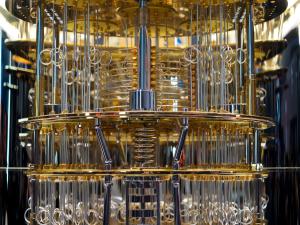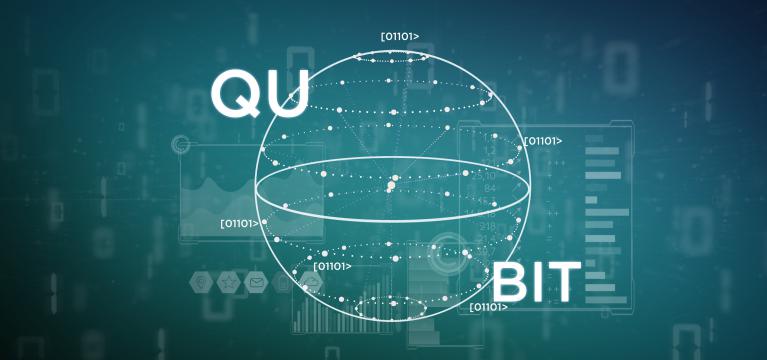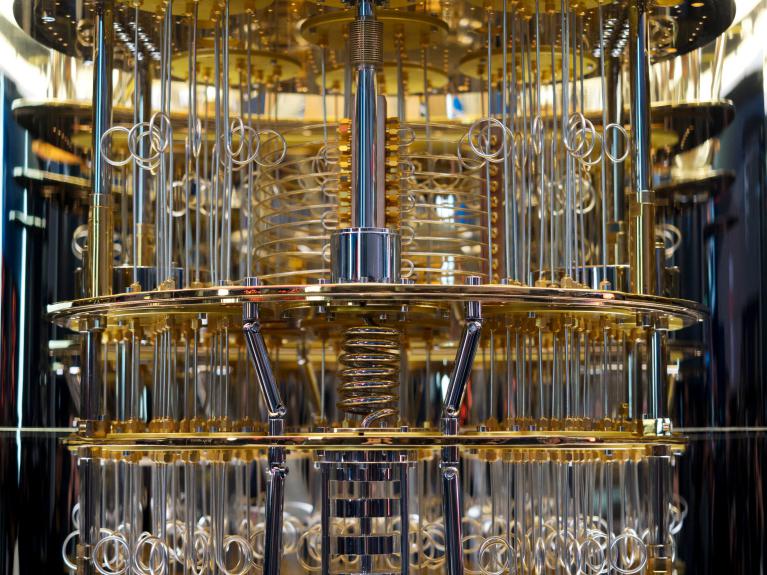To get a fair idea of what we are talking about, we must
imagine that for a given operation, 10,000 years would be
necessary for a classic supercomputer, whereas three minutes
will suffice for a quantum computer. Reading this information,
one might think of a hoax, had it not been published in the
journal Nature. Behind this announcement, we find Google
and its Sycamore 54-qubit processor. So, is quantum
supremacy, to use the term coined by John Preskill, a physicist
at the California Institute of Technology, launched?
Son of a cat!
But back to the first question, how does a quantum computer
work? Of course, this goes back to atomic and sub-atomic
physics. This strange world of the infinitely small is governed
by a very particular type of physics, quantum mechanics. Here,
a particle can have different natures simultaneously within the
framework of a superposition of possible states. To be here and
elsewhere at the same time, to present two states
simultaneously or alternately, excited or not. To illustrate,
nothing like the good old Schrödinger cat, this thought
experiment set out in 1935. We imagine a cat, locked in a box
equipped with a nuclear and deadly device. According to the
principles of quantum physics, as long as the box is closed,
the cat would be both dead and alive.
By opening the box, we will have the answer. The sighting will
take us back to our "physical" world where the feline will be
dead or alive. So to put it simply, a quantum superposition is
only valid in a quantum universe. But then what about the
computer of the same name, inscribed in our reality?

Quantum tactics
The memory of a typical computer is based on bits. Each bit
carries 1 or 0. Then the machine calculates by arranging these
bits. For its part, a quantum computing circuit is organized
from quantum bits (qubits or qbits). They can record data of 1
or 0 but in a simultaneous way. The qbit can therefore carry
data of 1, 0 or the superposition of a 1 and a 0. And in the logic of
quantum physics, the latter can also be combined, this is called
entanglement. The computer calculates by manipulating these
different distributions for spectacular computing power.
An example: in a library, you choose a book in which you draw
a cross on a page taken at random. Once the book is put back
in place, you then ask the computer to find it. The modern
computer will proceed by successively opening all the pages
of each book in the library until it finds the cross in question.
If you gave the same query to a quantum computer, it would
be able to go through all the pages of all the books at the same
time, and find the page almost instantly!
When is quantum coming?
Not tomorrow. Already, it is necessary to be able to produce
qbits in sufficient quantity to arrive at operational applications.
Faced with the resulting security and therefore sovereignty
issues, States are encouraging large companies and research
centers. The Americans and the Chinese are investing en masse
on the subject. Big tech giants regularly publish the status of
their progress in the race for quantum supremacy. Google, like
IBM, Honeywell, Microsoft or Intel are competing with
thunderous announcements on breakthroughs that lead to
imagination-defying performance. The strategic issue has not
escaped Europe's notice. In 2017, the EU committed one billion
euros over ten years to the Quantum Technology Flagship
program.
When China, through one of its BATXs, Alibaba, invests
$ 15 billion in AI, fintech and quantum research...
Whether in telecommunications, intelligence, energy
infrastructure, the pharmaceutical industry, supercomputers
could play a decisive role. This technology would also support
artificial intelligence by leveraging machine-learning
capabilities. Along with the United Kingdom and Germany,
France appears to be one of the leaders in quantum research.
But while it is involved in many projects, France does not lead
any. Nevertheless, it is very involved in the QuQube quantum
processor project in Grenoble, funded by the European
Research Council. Elsewhere, initiatives are developing.
Labs, start-ups, investment funds... France and Europe have
at their disposal certain advantages so as not to be left behind.
The Pulsalys incubator has enabled the young Alice & Bob
start-up, created by two young physicists from the Lyon ENS
[National Science School], with people talking about it with
work that could well revolutionize the approach to quantum
computing. The idea: to correct errors that occur naturally with
these supercomputers. At the physics laboratory of the ENS in
Lyon, Théau Peronnin, co-founder, explains: "our work shows
that it is possible to protect quantum information in the long
term". A breakthrough that, if confirmed, would open up a
market estimated at between 400 and 800 billion euros.
Together with Raphaël Lescanne, they now wish to bring
together university energies and knowledge around their
project. They have raised three million euros and are giving
themselves between two and three years to make it happen.
"We realized that in France, there was unique know-how in
the design of quantum machines", gladly note the two
founders. As if by echo, Cédric O, French Secretary of State
for Digital Matters, confirms that there is in our country an
exclusive porosity between research and young‘uns which
must be able to bring France to be among the best players
in the sector.

The hare and the turtle
Where are we today? "The first five kilometers of a marathon
and an adventure of ten to twenty years", said Romain
Alléaume, researcher in quantum cryptography at Télécom
Paris. Google has invested hundreds of millions of dollars over
the years, he says, but may have gone down an uncertain path.
This would allow Europe and France to catch up. So much the
better in view of the major security issues and national
sovereignty. Florence Parly, French Defense Minister,
underlines: "one cannot be surprised by a potential quantum
computer which would come to break the encryption of our
military data."
As for Mr. Everybody, it’s not tomorrow morning he’ll be walking around with a quantum smartphone. Already, to reduce
particle instabilities, quantum devices must be maintained at
temperatures close to absolute zero (-273°C) and occupy an
entire room. Rather, the future of quantum computing is likely
to be in the cloud, where companies will lease uptime.
Whatever it may be, for Honeywell boss Darius Adamczyk,
thanks to quantum computing, materials specialists will
discover new molecular structures, transportation companies
will optimize their logistics. Financial institutions will have faster
and more accurate applications. And pharmaceutical groups
will be accelerating the discovery of new drugs.°
Sources : site web radio Canada, Agence France Presse, Le Monde, Lyon Entreprises, Financial Times, New York Times, Le Parisien, The Verge, Washington Post







